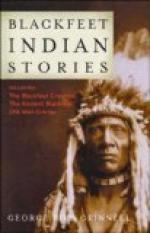* * * * *
The sun had already disappeared behind the sharp pointed dark peaks of the mountains. It was nearly night. As the light grew dim, the far stretching prairie began to be hidden. By a stream in a valley where grew large and small trees were the lodges of a great camp. For a long distance up and down the river rose the smokes of many fires.
On a hill overlooking the valley sat a person alone. His robe was drawn close about him, and he sat there without moving, looking down on the valley and out on the prairie above it. Perhaps he was watching for enemies; perhaps he was praying.
Creeping through the grass behind this person, something was slowly drawing near to him. There was no noise, the watcher heard nothing; still he sat there, looking out over the prairie, and turning his head neither to the right nor the left. This thing behind him kept creeping closer, and presently it was so near it could touch the man. Perhaps then there was some little rustle of the grass, and the watcher turned his head. It was too late. A strong arm around his neck bent his head back, a hand covered his mouth, a long stone knife was thrust into his breast, and he died in silence. The fading light had kept people in the camp from seeing what had happened.
The man who had used the knife scalped his enemy, and slowly, hidden by the grass, crept down the hill that he had just ascended, and when he reached the cover of a low place Mika’pi rose to his feet and crept away. He had another Snake scalp tied to his belt. His heart was glad, but he was not satisfied.
Several nights had passed since the signs warned him to turn back, but notwithstanding the warnings, he had succeeded. Perhaps his success had made him too confident. He longed for more of it. “One more scalp I shall take,” he said, “and then I will return to the people.”
He climbed far up the mountainside and hid among the pines and slept, but when day came he awoke and crept out to a point where he could see the camp. He saw the smoke rising as the women kindled their morning fires; he saw the people going about through the camp, and then presently he saw many people rush up on the hill where he had left the dead enemy. He could not hear their angry cries, nor their mournful wailings, but he knew how badly they felt, and he sung a song, for he was happy.
Once more the sun had disappeared behind the mountains, and as darkness grew Mika’pi came down from where he had been hiding and carefully approached the camp. Now was a time of danger. Now watchers might be hidden anywhere, looking for the approach of enemies, ready to raise a cry to warn the camp. Each bush or clump of rye grass or willow thicket might hide an enemy. Very slowly, looking and listening, Mika’pi crept around the outskirts of the camp. He made no noise, he did not show himself. Presently he heard some one clear his throat and then a cough, and a little bush




